Nissan Leaf VS Peugeot 308 – Specs, Efficiency & Price Comparison
Which model is the better choice – the Nissan Leaf or the Peugeot 308? We compare performance (217 HP vs 225 HP), boot capacity (394 L vs 412 L), efficiency (16.70 kWh vs 15.60 kWh1.30 L), and of course, the price (30800 £ vs 25000 £).
Find out now which car fits your needs better!
The Nissan Leaf (Hatchback) is powered by a Electric engine and comes with a Automatic transmission. In comparison, the Peugeot 308 (Hatchback) features a Petrol MHEV, Petrol, Diesel, Plugin Hybrid or Electric engine and a Automatic or Manuel gearbox.
When it comes to boot capacity, the Nissan Leaf offers 394 L, while the Peugeot 308 provides 412 L – depending on what matters most to you. If you’re looking for more power, you’ll need to decide whether the 217 HP of the Nissan Leaf or the 225 HP of the Peugeot 308 suits your needs better.
There are also differences in efficiency: 16.70 kWh vs 15.60 kWh1.30 L. In terms of price, the Nissan Leaf starts at 30800 £, while the Peugeot 308 is available from 25000 £.
Compare all the key specs now and find out which model fits your lifestyle best!
Nissan Leaf
The Nissan Leaf stands out as a pioneering model in the realm of electric vehicles, known for its impressive blend of practicality and eco-friendliness. It offers a smooth and quiet driving experience, making it an ideal choice for city commuting and longer journeys alike. The interior design is both comfortable and intuitive, providing drivers with a sense of modernity and ease of use.
details @ germany.nissannews.com
@ germany.nissannews.com
 @ germany.nissannews.com
@ germany.nissannews.com
 @ germany.nissannews.com
@ germany.nissannews.com
 @ germany.nissannews.com
@ germany.nissannews.com
Peugeot 308
The Peugeot 308 presents a refined blend of style and sophistication, making it a compelling option for anyone in search of a dynamic yet practical vehicle. Its sleek design is complemented by a thoughtfully crafted interior that ensures both driver and passengers travel in comfort and elegance. Moreover, the 308 offers a responsive driving experience, combining agility with a sense of security on the road.
details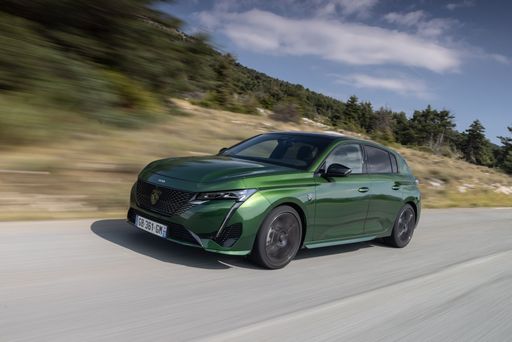 @ media.stellantis.com
@ media.stellantis.com
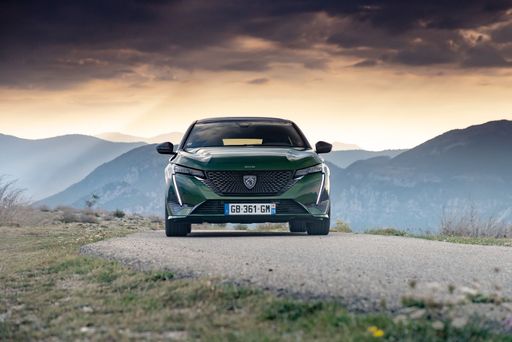 @ media.stellantis.com
@ media.stellantis.com
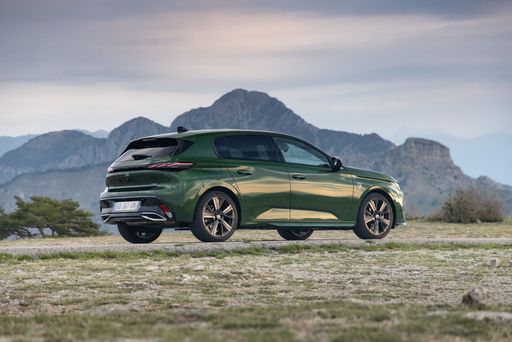 @ media.stellantis.com
@ media.stellantis.com
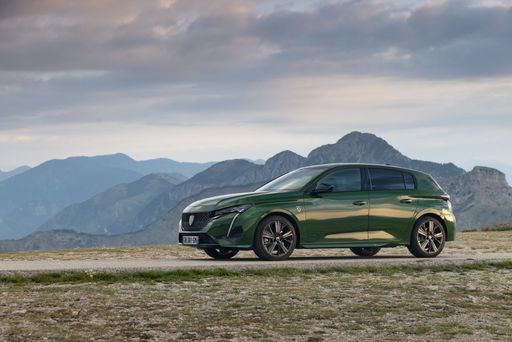 @ media.stellantis.com
@ media.stellantis.com
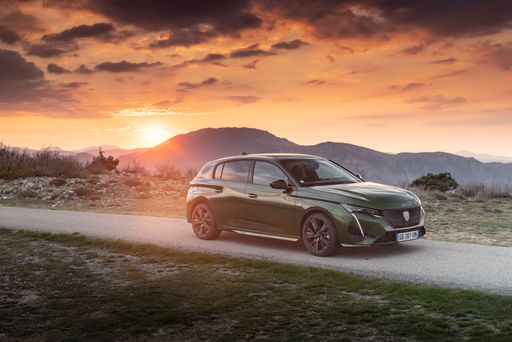 @ media.stellantis.com
@ media.stellantis.com
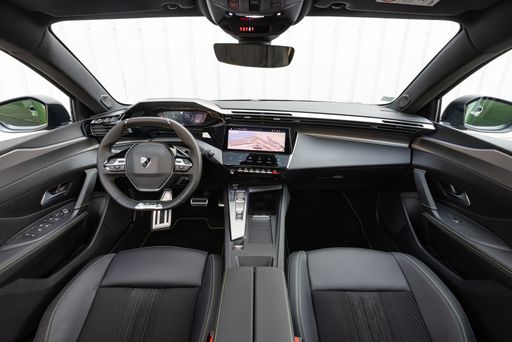 @ media.stellantis.com
@ media.stellantis.com

|

|
|
|
|
Costs and Consumption |
|
|---|---|
|
Price
30800 - 37200 £
|
Price
25000 - 40700 £
|
|
Consumption L/100km
-
|
Consumption L/100km
1.3 - 5.9 L
|
|
Consumption kWh/100km
16.7 - 17.8 kWh
|
Consumption kWh/100km
15.60 kWh
|
|
Electric Range
270 - 385 km
|
Electric Range
57 - 419 km
|
|
Battery Capacity
39 - 59 kWh
|
Battery Capacity
11.3 - 51 kWh
|
|
co2
0 g/km
|
co2
0 - 133 g/km
|
|
Fuel tank capacity
-
|
Fuel tank capacity
40 - 53 L
|
Dimensions and Body |
|
|---|---|
|
Body Type
Hatchback
|
Body Type
Hatchback
|
|
Seats
5
|
Seats
5
|
|
Doors
5
|
Doors
5
|
|
Curb weight
1580 - 1756 kg
|
Curb weight
1333 - 1759 kg
|
|
Trunk capacity
385 - 394 L
|
Trunk capacity
361 - 412 L
|
|
Length
4490 mm
|
Length
4367 mm
|
|
Width
1788 mm
|
Width
1852 mm
|
|
Height
1540 - 1545 mm
|
Height
1441 mm
|
|
Payload
384 - 415 kg
|
Payload
412 - 510 kg
|
Engine and Performance |
|
|---|---|
|
Engine Type
Electric
|
Engine Type
Petrol MHEV, Petrol, Diesel, Plugin Hybrid, Electric
|
|
Transmission
Automatic
|
Transmission
Automatic, Manuel
|
|
Transmission Detail
Reduction Gearbox
|
Transmission Detail
Dual-Clutch Automatic, Manual Gearbox, Automatic Gearbox, Reduction Gearbox
|
|
Drive Type
Front-Wheel Drive
|
Drive Type
Front-Wheel Drive
|
|
Power HP
150 - 217 HP
|
Power HP
130 - 225 HP
|
|
Acceleration 0-100km/h
6.9 - 7.9 s
|
Acceleration 0-100km/h
7.5 - 10.6 s
|
|
Max Speed
144 - 157 km/h
|
Max Speed
170 - 235 km/h
|
|
Torque
320 - 340 Nm
|
Torque
230 - 360 Nm
|
|
Number of Cylinders
-
|
Number of Cylinders
3 - 4
|
|
Power kW
110 - 160 kW
|
Power kW
96 - 165 kW
|
|
Engine capacity
-
|
Engine capacity
1199 - 1598 cm3
|
General |
|
|---|---|
|
Model Year
2019
|
Model Year
2023 - 2024
|
|
CO2 Efficiency Class
A
|
CO2 Efficiency Class
C, D, B, A
|
|
Brand
Nissan
|
Brand
Peugeot
|
Nissan Leaf
Introduction to the Nissan Leaf: A Pioneer in Electric Mobility
The Nissan Leaf has established itself as a trailblazer in the realm of electric vehicles (EVs) since its launch. As we delve into its present-day iterations, the Leaf continues to soar in popularity due to remarkable advancements in technology and sustainability. Let's explore what makes the Nissan Leaf a standout in today's automotive market.
Power and Performance: Under the Hood of the Nissan Leaf
The Nissan Leaf boasts a power output ranging from 150 to 217 PS, depending on the battery option chosen. The vehicle's electric motor, a product of cutting-edge engineering, offers instant torque ranging from 320 to 340 Nm, resulting in impressive acceleration capabilities. The 0 to 100 km/h dash is achieved in as little as 6.9 seconds, showcasing its prowess in electric performance.
Battery Technology: Efficient Energy Management
When discussing the Nissan Leaf, battery technology is at the forefront. The available battery capacities range from 39 to 59 kWh, supporting an electric range between 270 to 385 km. This flexibility allows drivers to choose a model that best fits their driving habits, providing peace of mind for longer journeys without frequent recharging.
Sustainability: The Environmental Edge
One of the primary attractions of the Nissan Leaf is its commitment to sustainability. As an all-electric vehicle, it produces zero CO2 emissions, placing it in the top tier of the CO2-efficiency class with an 'A' rating. This clean energy approach contributes significantly to reducing environmental impact and supports Nissan's drive towards a greener future.
Design and Comfort: Aesthetic Appeal and Practicality
The Nissan Leaf is not just about efficiency; it's also designed for comfort and utility. With its sleek hatchback body and dimensions of 4490 mm in length, 1788 mm in width, and a height of up to 1545 mm, it offers ample interior space. The boot capacity ranges from 385 to 394 litres, providing sufficient storage for everyday needs. The model accommodates five passengers comfortably, ensuring a pleasant ride for everyone.
Innovations and Safety: Advanced Features for Peace of Mind
Nissan equips the Leaf with an array of intelligent features that enhance safety and convenience. The available equipment lines, including N-CONNECTA, Tekna, e+ N-CONNECTA, and e+ Tekna, offer varying levels of technology integration. ProPILOT Assist, e-Pedal, and a comprehensive suite of driver-assistance technology are just a few examples that highlight Nissan's commitment to innovation in the EV market.
Conclusion: The Nissan Leaf Continues to Lead
With prices ranging from €35,900 to €43,400, the Nissan Leaf remains an attractive choice for those looking to embrace electric mobility. It perfectly balances performance, design, and sustainability, making it a compelling choice in the competitive EV landscape. The Nissan Leaf not only represents the future of driving but also reinforces why it continues to be a leader in the electric vehicle community.
Peugeot 308
Unveiling the Peugeot 308: A Blend of Style and Innovation
The Peugeot 308, an exemplar of French automotive engineering, brings together sleek design, advanced technology, and efficient performance. This hatchback caters to a diverse range of drivers, from eco-conscious individuals to those seeking a spirited driving experience. Let’s delve into the technical details and innovative features that define the Peugeot 308.
Powertrain Options: From Conventional to Cutting Edge
The Peugeot 308 offers an impressive array of powertrains to suit varying preferences and needs. Whether you opt for a traditional petrol, a fuel-efficient diesel, a sophisticated plug-in hybrid, or the fully electric variant, the 308 ensures an engaging drive. Petrol and diesel engines offer power outputs ranging from 130 to 130 PS, catering to both urban commutes and highway drives. The plug-in hybrid variants, boasting up to 225 PS, promise a seamless blend of power and efficiency, with an electric-only range of up to 57 km, perfect for city driving.
Engineering and Efficiency: Striking a Balance
The engineering marvel lies in the Peugeot 308's commitment to efficiency without compromising on performance. The fuel economy stands out, with consumption figures between 1.3 L/100km for plug-in hybrids and 5.9 L/100km for petrol engines. The electric version showcases an impressive 15.6 kWh/100km, allowing an electric range of 419 km, making it a viable option for those looking to reduce their carbon footprint.
Anatomy of Design: Sleek and Functional
Peugeot’s design philosophy shines through in the 308, with a captivating combination of elegance and practicality. Its dimensions - 4367mm in length, 1852mm in width, and 1441mm in height - create a spacious yet maneuverable vehicle. The five-door hatchback accommodates up to five passengers, offering a comfortable journey while boasting a boot space of 361 to 412 litres.
Technological Innovations and Features
The 308's cabin is a testament to Peugeot's commitment to innovation. It features an intuitive digital i-Cockpit, offering a more engaging driving interface with a configurable 10-inch digital cluster and a high-definition central touchscreen. Advanced driver assistance systems ensure safety and convenience, including adaptive cruise control, lane-keeping assist, and automated emergency braking, which elevate the driving experience.
Performance and Dynamics: Designed for the Enthusiast
Performance in the Peugeot 308 is not merely a promise but a reality, with acceleration from 0-100 km/h achieved in 7.5 to 10.6 seconds depending on the model. The dynamic chassis ensures a stable and responsive driving experience, while the range of gearbox options, including a smooth automatic and a manual transmission, cater to different driving styles.
Conclusion: The Allure of the Peugeot 308
The Peugeot 308 epitomises the blend of style, efficiency, and innovation. It offers a diverse range of powertrain options, ensuring that there’s a 308 for every kind of driver. Whether you're drawn to its design, captivated by its technology, or impressed by its efficiency, the 308 stands as a testament to Peugeot's evolution in the modern automotive landscape.
The prices and data displayed are estimates based on German list prices and may vary by country. This information is not legally binding.
